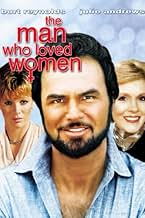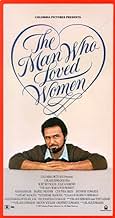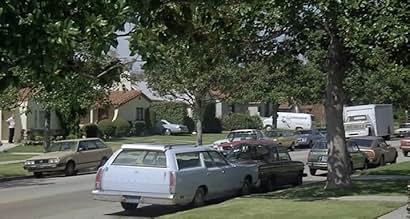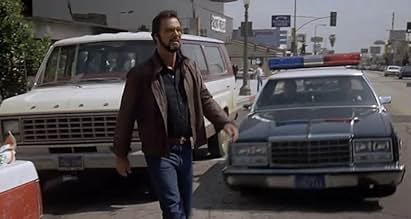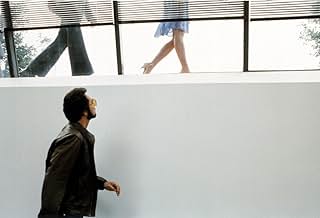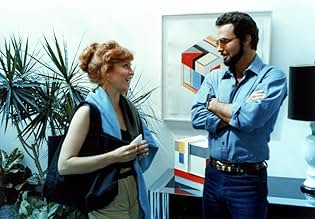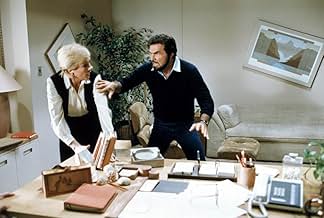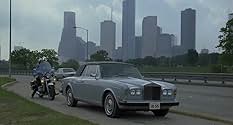IMDb-BEWERTUNG
5,3/10
2729
IHRE BEWERTUNG
Füge eine Handlung in deiner Sprache hinzuA womanizing sculptor named David goes to seek help from a psychiatrist, Marianna, to cure him of his obsession with women.A womanizing sculptor named David goes to seek help from a psychiatrist, Marianna, to cure him of his obsession with women.A womanizing sculptor named David goes to seek help from a psychiatrist, Marianna, to cure him of his obsession with women.
Cynthia Sikes Yorkin
- Courtney
- (as Cynthia Sikes)
Herb Tanney
- Doctor
- (as Schweitzer Tanney)
Empfohlene Bewertungen
Here is a picture that, for every conceivable reason, shouldn't work -- but on a purely emotional level, it does. Most viewers could be easily misled (and disappointed) by expecting a light romantic comedy or a wild sex farce. Instead, Blake Edwards and his co-screenwriters offer something entirely different, a picture far more complex, meaningful, and thought-provoking than what we might anticipate.
"The Man Who Loved Women" tells a sad, sad story about a middle-aged man (Burt Reynolds in one of his finest performances, as David Fowler) who drowns in isolation thanks to a rare ability: he's forced and driven, by instinct, to glimpse the sacredness and inner beauty of almost every woman he encounters. Yes, on some levels, his circumstances lead to a hedonistic paradise. But his feelings also prevent him from ever making a commitment, and isolate him from the joy of knowing one woman exclusively.
For that reason, a melancholic canopy hangs over the entire film and takes the front seat to humour. The story begins with David Fowler's death, and every event we witness onscreen is tinged by our knowledge that Fowler's obsession with women will eventually kill him. A slow, heavy, stringed theme song, Mancini's "Little Boys", plays softly throughout the film, and Fowler's words (in voice-over narration) constantly remind us of the deep, incurable loneliness that plagues him.
All of this might sound heavy-handed -- and it very well could be, if it weren't for the sexual fantasy and wild Edwards comedy that flesh out the story and provide relief. The melancholia and comedy work together, and Edwards achieves a delicate balance of mood --a bittersweet aura.
I've heard one criticism (see Ebert's review) that many of the story's psychological elements are impossible. Though a few scenes might suffer from exaggeration (hundreds and HUNDREDS of women attend David's funeral), one could easily dismiss the story -- as I did, at first --because so many male viewers *lack* Fowler's ability to care for women unconditionally; we want to believe that it's impossible for a contemporary Don Juan to exist. But that simply isn't tenable. My own theory about the film -- (and it's just a theory) -- is that Edwards may have pulled inspiration for Fowler from the late John Derek, another man worshipped and adored by women, who interacted with Edwards during the filming of "10" (1979).
Edwards and his co-writers lend a gentle touch to the film by crafting Fowler's character against-the-grain; while we might expect a narcissistic hedonist, he's just the opposite -- a warm, gentle, soul with only the sincerest motives. It's easy to understand why women are attracted to Fowler, from his first appearance onscreen. And, oddly -- male viewers may never begrudge Fowler his affairs, only applaud -- because his narration and his gentle spirit confirm the fact that he really does worship and adore everything about the girls who walk in and out of his life. "I keep thinking," he says sadly, "about all the women I'm never gonna know..."
In one of the film's most revealing and effective moments, Edwards allows us to glimpse a woman, at the funeral, who is the complete opposite of a "10" -- fat, homely, depressed -- undesirable. We have the distinct impression that her external appearance didn't matter to Fowler -- that he only looked into her heart and perceived her beauty. It lends credibility to psychologist Marianna's (Julie Andrews) observation: that David did, indeed, love all of the girls, equally and unconditionally.
"The Man Who Loved Women" tells a sad, sad story about a middle-aged man (Burt Reynolds in one of his finest performances, as David Fowler) who drowns in isolation thanks to a rare ability: he's forced and driven, by instinct, to glimpse the sacredness and inner beauty of almost every woman he encounters. Yes, on some levels, his circumstances lead to a hedonistic paradise. But his feelings also prevent him from ever making a commitment, and isolate him from the joy of knowing one woman exclusively.
For that reason, a melancholic canopy hangs over the entire film and takes the front seat to humour. The story begins with David Fowler's death, and every event we witness onscreen is tinged by our knowledge that Fowler's obsession with women will eventually kill him. A slow, heavy, stringed theme song, Mancini's "Little Boys", plays softly throughout the film, and Fowler's words (in voice-over narration) constantly remind us of the deep, incurable loneliness that plagues him.
All of this might sound heavy-handed -- and it very well could be, if it weren't for the sexual fantasy and wild Edwards comedy that flesh out the story and provide relief. The melancholia and comedy work together, and Edwards achieves a delicate balance of mood --a bittersweet aura.
I've heard one criticism (see Ebert's review) that many of the story's psychological elements are impossible. Though a few scenes might suffer from exaggeration (hundreds and HUNDREDS of women attend David's funeral), one could easily dismiss the story -- as I did, at first --because so many male viewers *lack* Fowler's ability to care for women unconditionally; we want to believe that it's impossible for a contemporary Don Juan to exist. But that simply isn't tenable. My own theory about the film -- (and it's just a theory) -- is that Edwards may have pulled inspiration for Fowler from the late John Derek, another man worshipped and adored by women, who interacted with Edwards during the filming of "10" (1979).
Edwards and his co-writers lend a gentle touch to the film by crafting Fowler's character against-the-grain; while we might expect a narcissistic hedonist, he's just the opposite -- a warm, gentle, soul with only the sincerest motives. It's easy to understand why women are attracted to Fowler, from his first appearance onscreen. And, oddly -- male viewers may never begrudge Fowler his affairs, only applaud -- because his narration and his gentle spirit confirm the fact that he really does worship and adore everything about the girls who walk in and out of his life. "I keep thinking," he says sadly, "about all the women I'm never gonna know..."
In one of the film's most revealing and effective moments, Edwards allows us to glimpse a woman, at the funeral, who is the complete opposite of a "10" -- fat, homely, depressed -- undesirable. We have the distinct impression that her external appearance didn't matter to Fowler -- that he only looked into her heart and perceived her beauty. It lends credibility to psychologist Marianna's (Julie Andrews) observation: that David did, indeed, love all of the girls, equally and unconditionally.
In the style of STARTING OVER, Burt took on another romantic lead in 1983's THE MAN WHO LOVED WOMEN, which starred Reynolds as a confirmed bachelor whose obsession with the opposite sex has driven him into therapy with a female shrink of course (Julie Andrews in a low-key performance). Though not as good as his performance in STARTING OVER, Reynolds does exude a great deal of charm in this film and get solid support from Andrews, Marilu Henner, and in an early and very amusing role, Kim Basinger as the undersexed trophy wife of a wealthy Texan (Barry Corbin)who likes her sex with an element of danger. This comedy that was co-written by Blake Edwards and his own psychiatrist is worth a look.
In the climactic moment of one of the great film scripts of all time, "The Verdict" by David Mamet, attorney Edward Concannon (James Mason) implores the judge, "We can't be expected to accept a (photo)copy when we have the original."
Many consider Truffaut's 1977 "L'homme qui aimait les femmes" a wonderful film. Anyone who has seen this original, need not venture to this 1983 remake, the land of Blake Edwards, his family and his friends.
This film likely falls under the category of 'the studio still needs another film from me (Edwards) and I have not a single inspired idea'.
Don't get me wrong. I'm an avid fan of Edwards, and consider many of his films (notably Days of Wine and Roses, Breakfast at Tiffanys, S.O.B., and Operation Petticoat to ALL be amongst my favorites. Of course the Pink Panther series is a masterpiece in and of itself.
But this film is weak, and uninspired, laden with narrative-I've never really figured who came up with the idea of opening a 'comedy' with the main character's funeral, and an accompanying heart-wrenching eulogy from one of his lovers.
Don't accept a copy when the original is available.
Many consider Truffaut's 1977 "L'homme qui aimait les femmes" a wonderful film. Anyone who has seen this original, need not venture to this 1983 remake, the land of Blake Edwards, his family and his friends.
This film likely falls under the category of 'the studio still needs another film from me (Edwards) and I have not a single inspired idea'.
Don't get me wrong. I'm an avid fan of Edwards, and consider many of his films (notably Days of Wine and Roses, Breakfast at Tiffanys, S.O.B., and Operation Petticoat to ALL be amongst my favorites. Of course the Pink Panther series is a masterpiece in and of itself.
But this film is weak, and uninspired, laden with narrative-I've never really figured who came up with the idea of opening a 'comedy' with the main character's funeral, and an accompanying heart-wrenching eulogy from one of his lovers.
Don't accept a copy when the original is available.
Blake Edwards in the Sixties was an amazing director, with a strong visual flair. I mean he directed "Breakfast at Tiffany's", "Days of Wine and Roses", and "An Experiment in Terror"! But somewhere in all that Pink Panthering he did in the Seventies he lost that visual flair and became boring. The only film in the last thirty years that showed any of the old panache was "Victor/Victoria". It's like there are two Blake Edwards.
That's not to say that this film is terrible - it's just that I think he could have done so much better. It's so dull to look at - despite the presence of his enchanting wife Julie Andrews, and one of Burt Reynolds' best performances. Also of note is a very young Kim Basinger displaying a strong flair for comedy. But Edwards' pacing of the action is so slow and ponderous that the moments of slapstick comedy seem completely incongruous and fall completely flat.
Come on Blake - give us some more of that old magic! I know it's still in you.
That's not to say that this film is terrible - it's just that I think he could have done so much better. It's so dull to look at - despite the presence of his enchanting wife Julie Andrews, and one of Burt Reynolds' best performances. Also of note is a very young Kim Basinger displaying a strong flair for comedy. But Edwards' pacing of the action is so slow and ponderous that the moments of slapstick comedy seem completely incongruous and fall completely flat.
Come on Blake - give us some more of that old magic! I know it's still in you.
Has there ever been a film where Julie Andrews didn't do a good job? I thought she was great as David Fowler's analyst--so calm and poised, regardless of how ridiculous Fowler's problems got, or how agitated he became. Burt Reynolds was ... well, Burt Reynolds, but that's enough. Barry Corbin seemed a natural for the role of a Texas oilman/rancher in a cowboy hat. If he wasn't on 'Dallas' (and I don't think he was in the years I watched it), he should have been. I liked Marilu Henner as Agnes but wish we had seen more of her. I didn't recognize Kim Basinger or Sela Ward, but I like them both in most of what I've seen.
It wasn't a great film, but a good one. It was funny enough of the time, though it could be depressing.
It wasn't a great film, but a good one. It was funny enough of the time, though it could be depressing.
Wusstest du schon
- WissenswertesThis movie, a remake, was released six years after François Truffaut's source French movie Der Mann, der die Frauen liebte (1977).
- PatzerWhen Julie Andrews unwraps the book on the plane, the front cover is visible before she flips it over to face her, but then when it is shown from her point of view, it looks completely different.
- Zitate
Agnes Chapman: You're a fast worker. I better leave before one of us gets pregnant.
David Fowler: I'm not that fast.
- SoundtracksLittle Boys (theme song)
Music by Henry Mancini
Lyrics by Alan Bergman & Marilyn Bergman
[Played over the closing credits]
Performed by Helen Reddy
Top-Auswahl
Melde dich zum Bewerten an und greife auf die Watchlist für personalisierte Empfehlungen zu.
- How long is The Man Who Loved Women?Powered by Alexa
Details
- Erscheinungsdatum
- Herkunftsland
- Offizieller Standort
- Sprachen
- Auch bekannt als
- The Man Who Loved Women
- Drehorte
- Houston, Texas, USA(Texas scenes.)
- Produktionsfirmen
- Weitere beteiligte Unternehmen bei IMDbPro anzeigen
Box Office
- Budget
- 12.000.000 $ (geschätzt)
- Bruttoertrag in den USA und Kanada
- 10.964.740 $
- Eröffnungswochenende in den USA und in Kanada
- 1.347.032 $
- 18. Dez. 1983
- Weltweiter Bruttoertrag
- 10.964.740 $
- Laufzeit
- 1 Std. 50 Min.(110 min)
- Sound-Mix
- Seitenverhältnis
- 1.85 : 1
Zu dieser Seite beitragen
Bearbeitung vorschlagen oder fehlenden Inhalt hinzufügen


